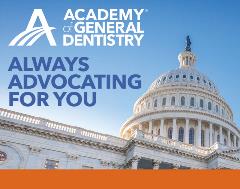AGD Leaders Focus on Legislative Initiatives to Support General Dentistry
 AGD’s Legislative & Government Affairs (LGA) Council develops policy for AGD’s Board of Trustees and House of Delegates to consider. We look to support general dentists and the patients we serve.
AGD’s Legislative & Government Affairs (LGA) Council develops policy for AGD’s Board of Trustees and House of Delegates to consider. We look to support general dentists and the patients we serve. The LGA Council met in January and selected legislative priorities for 2022. This includes reestablishing its Medicare Subcommittee and support for the Medicaid Dental Benefits Act. There is an extensive list of 2022 Legislative Priorities, three of which will be chosen to discuss with congressmembers/senators or their staff during AGD’s Hill Day. The issues include oral health literacy, adult Medicaid, midlevel providers, recovery audit contractor (RAC) Medicaid audits, student loan debt, COVID-19-related activities, dental benefits in Medicare, dental health professional shortage areas (dental HPSAs) reform and dental care for veterans.
During the meeting, the council received a federal update from AGD’s Washington adviser, Pat O’Connor. AGD interfaces with legislators, federal health agencies (HRSA and CMS), and outside conferences such as the National Conference of State Legislatures (NCSL) and the American Legislative Exchange Council (ALEC). AGD also participates in the Organized Dentistry Coalition (ODC). AGD’s dental leadership and staff educate decision-makers.
LGA Council Chair Mike Bromberg, DDS, has appointed Richard A. Huot, DDS, FAGD, chair of the Medicare Subcommittee.
The council voted unanimously to support in concept S. 3166, the Medicaid Dental Benefit Act of 2021. There was discussion and concern about covered services, but acknowledgment of the need, especially for very low-income older adults who are Medicaid beneficiaries. Some states don’t cover adult Medicaid dental services since it is an optional benefit to states.
The Council decided to enhance grassroots advocacy efforts related to the Oral Health Literacy and Awareness Act (H.R. 4555) and the Dental and Optometric (DOC) Access Act (H.R. 3461/S. 1793). H.R. 4555 would authorize funding for a five-year oral health literacy campaign across Health Resources & Services Administration (HRSA) programs. The initiative would help develop and test evidence-based oral health literacy strategies to provide oral disease prevention education to vulnerable populations. AGD staff and leaders are working diligently to secure a Senate bill sponsor, as the legislation has successfully passed through the House.
The DOC Access Act would prohibit dental benefits carriers from setting fees that contracted dentists may charge patients for services not covered under their dental plan. Additionally, the legislation would provide greater access to high-quality care by helping to curb anti-patient and anti-competitive practices of dental insurance plans, as they often use fee-setting to shift costs to patients who are paying for their coverage out of their own pockets or are seeing a dentist out of network.
LGA encourages members to visit AGD Advocacy’s webpage, where you can read our bi-weekly “Capitol Connections” newsletter, take action on issues impacting general dentistry, and learn how AGD and the LGA Council are working to advocate for the profession.
